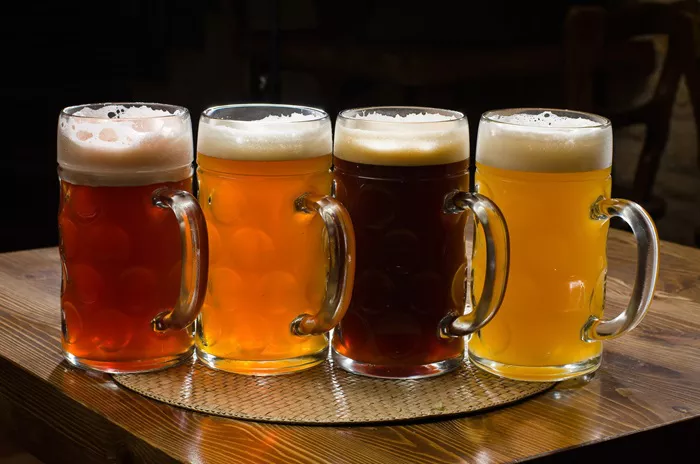Non-alcoholic beer has become increasingly popular in recent years as a beverage option for those who want to enjoy the taste of beer without the intoxicating effects of alcohol. However, many people are surprised to learn that non-alcoholic beer still contains a small amount of alcohol. In this extensive essay, we will explore the reasons why non-alcoholic beer has alcohol and what factors contribute to its presence.
Introduction
Non-alcoholic beer is a beverage that is designed to mimic the taste and characteristics of traditional beer but with a significantly reduced alcohol content. While it is often marketed as a zero-alcohol or low-alcohol option, non-alcoholic beer typically contains a small amount of alcohol, usually less than 0.5% by volume.
The Brewing Process of Beer
1. Ingredients and Fermentation
Beer is made from a combination of water, malted barley, hops, and yeast.
The fermentation process involves the yeast converting the sugars in the malted barley into alcohol and carbon dioxide.
The length of fermentation and the type of yeast used can affect the alcohol content of the final product.
2. Alcohol Formation in Traditional Beer
In traditional beer brewing, the goal is to produce a beverage with a specific alcohol content, usually ranging from 3% to 10% by volume.
The fermentation process is carefully controlled to ensure that the right amount of alcohol is produced.
Factors such as temperature, yeast strain, and fermentation time can all influence the alcohol content.
The Production of Non-Alcoholic Beer
1. Methods of Removing Alcohol
There are several methods used to produce non-alcoholic beer, including vacuum distillation, reverse osmosis, and dealcoholization using special membranes.
These methods aim to remove or reduce the alcohol content of the beer while preserving its flavor and characteristics.
2. Challenges in Removing Alcohol Completely
Removing all traces of alcohol from beer is extremely difficult and often not economically feasible.
Even with advanced production techniques, it is nearly impossible to completely eliminate all alcohol from the beer.
Small amounts of alcohol may remain due to the nature of the brewing process and the limitations of the removal methods.
Factors Contributing to Alcohol in Non-Alcoholic Beer
1. Residual Alcohol from Fermentation
Even after the alcohol removal process, some residual alcohol may remain in the beer.
This is because it is difficult to completely stop the fermentation process and ensure that all alcohol is removed.
The yeast may continue to produce small amounts of alcohol even after the main fermentation is complete.
2. Limits of Alcohol Removal Technology
The technology used to remove alcohol from beer is not perfect and has its limitations.
Some methods may not be able to remove all alcohol, especially at very low concentrations.
Additionally, the removal process may affect the flavor and quality of the beer, making it difficult to achieve a completely alcohol-free product.
3. Natural Occurrence of Alcohol in Ingredients
Some of the ingredients used in beer, such as malted barley and hops, may naturally contain small amounts of alcohol.
While these amounts are usually very low, they can contribute to the overall alcohol content of the non-alcoholic beer.
Legal Definitions and Regulations
1. Definition of Non-Alcoholic Beer
In most countries, non-alcoholic beer is defined as having an alcohol content of less than 0.5% by volume.
This definition is based on the understanding that small amounts of alcohol may still be present in the beer but are considered negligible.
2. Regulatory Requirements
Beverage manufacturers must comply with specific regulations regarding the labeling and marketing of non-alcoholic beer.
These regulations ensure that consumers are informed about the alcohol content and that the product is accurately represented.
3. Consumer Perception and Expectations
Consumers may have different expectations regarding the alcohol content of non-alcoholic beer.
Some may assume that non-alcoholic beer is completely alcohol-free, while others understand that it may contain a small amount of alcohol.
Clear labeling and communication can help manage consumer expectations and ensure that they make informed choices.
See Also: What Style Beer Is Heineken?
Health Implications
1. Risks Associated with Alcohol Consumption
Consuming even small amounts of alcohol can have health implications, especially for certain individuals.
For example, people with liver problems, pregnant women, and those taking certain medications may need to avoid even trace amounts of alcohol.
2. Benefits of Non-Alcoholic Beer
Non-alcoholic beer can offer some benefits compared to traditional beer, such as reduced calorie and alcohol content.
It can be a suitable option for those who want to enjoy the taste of beer without the negative effects of alcohol.
3. Moderation and Responsible Consumption
As with any beverage, moderation is key when consuming non-alcoholic beer.
While the alcohol content is low, it is still important to be aware of the potential risks and consume non-alcoholic beer in moderation.
Conclusion
In conclusion, non-alcoholic beer contains a small amount of alcohol due to several factors. Residual alcohol from fermentation, limitations of alcohol removal technology, and the natural occurrence of alcohol in ingredients all contribute to the presence of alcohol in non-alcoholic beer. Despite the efforts to produce a truly alcohol-free product, it is nearly impossible to completely eliminate all alcohol. Consumers should be aware of the alcohol content of non-alcoholic beer and make informed choices based on their individual health needs and preferences. Additionally, regulatory authorities play an important role in ensuring that non-alcoholic beer is accurately labeled and marketed to meet consumer expectations.
You might be interested


